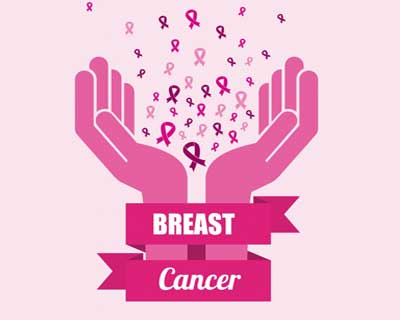- Home
- Editorial
- News
- Practice Guidelines
- Anesthesiology Guidelines
- Cancer Guidelines
- Cardiac Sciences Guidelines
- Critical Care Guidelines
- Dentistry Guidelines
- Dermatology Guidelines
- Diabetes and Endo Guidelines
- Diagnostics Guidelines
- ENT Guidelines
- Featured Practice Guidelines
- Gastroenterology Guidelines
- Geriatrics Guidelines
- Medicine Guidelines
- Nephrology Guidelines
- Neurosciences Guidelines
- Obs and Gynae Guidelines
- Ophthalmology Guidelines
- Orthopaedics Guidelines
- Paediatrics Guidelines
- Psychiatry Guidelines
- Pulmonology Guidelines
- Radiology Guidelines
- Surgery Guidelines
- Urology Guidelines
Chemotherapy not necessary in most breast cancer patients: Landmark study

Chemotherapy is an integral part of Breast cancer treatment in addition to Hormone therapy after surgery. In a new study, U.S. researchers have found that as many as 70 percent of women with early-stage breast cancer and an intermediate risk of cancer recurrence can safely skip chemotherapy after their tumors have been removed. A 21-gene test Oncotype DX from Genomic Health performed on tumors shall enable most patients with the most common type of early breast cancer to safely forgo chemotherapy. The landmark study has been published in the New England Journal of Medicine.
Dr. Albain, at Loyola University Chicago Stritch School of Medicine and colleagues have conducted research with the 21-gene test and which was presented at the American Society of Clinical Oncology (ASCO) meeting in Chicago, that studied how to treat women with early-stage breast cancer that responds to hormone therapy.
"With results of this groundbreaking study, we now can safely avoid chemotherapy in about 70 percent of patients who are diagnosed with the most common form of breast cancer," main co-authors of the study,Dr. Albain said. "For countless women and their doctors, the days of uncertainty are over."
This is a major finding,” said Dr. Larry Norton, a breast cancer expert at Memorial Sloan Kettering Cancer Center in New York, who helped organize the government-funded study more than a decade ago.“It means that maybe 100,000 women in the United States alone do not require chemotherapy,” Norton said.
The study enrolled 10,273 women who had the most common type of breast cancer (hormone-receptor positive, HER-2 negative) that had not spread to lymph nodes. Researchers examined outcomes of the 69 percent of patients who had intermediate scores on the 21-gene test.
Patients were randomly assigned to receive chemotherapy followed by hormonal therapy or hormone therapy alone. Researchers examined the chemotherapy and non-chemotherapy groups for several outcomes, including being cancer free, having cancer recur locally or to distant sites in the body and overall survival.
The study found that all women over 50 with this type of breast cancer could skip chemotherapy, a group that represented 85 percent of the study’s population. In addition, women 50 and younger who scored between zero and 15 could be spared chemotherapy and its toxic side effects.
However, chemotherapy did offer some benefit to women aged 50 and younger who had a cancer recurrence score of 16-25, researchers found.
Dr. Steven Shak, the chief scientific officer at Genomic Health, said about four in 10 women in the United States with early-stage breast cancers are not tested for recurrence risk. He expects the study’s results will change that practice.“This is going to provide the highest level of evidence now for our test being indispensable in clinical practice,” Shak said.
The findings of the study will greatly expand the number of patients who can forgo chemotherapy without compromising their outcomes.
For further reference log on to :
DOI: 10.1056/NEJMoa1804710

Disclaimer: This site is primarily intended for healthcare professionals. Any content/information on this website does not replace the advice of medical and/or health professionals and should not be construed as medical/diagnostic advice/endorsement or prescription. Use of this site is subject to our terms of use, privacy policy, advertisement policy. © 2020 Minerva Medical Treatment Pvt Ltd